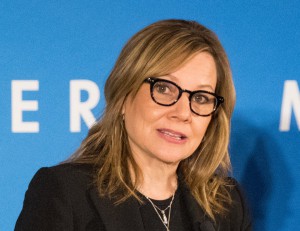
David Einhorn, head of Greenlight Capital, wants GM to split its stock into two classes. He believes the move would nearly double the company's stock price.
General Motors is reminding shareholders this week that the incumbent board of directors has the support of two groups that advise institutional investors, such as pension funds, on how to vote on resolutions presented by shareholders.
Both Institutional Shareholder Services and Glass Lewis, two organizations that advise on proxy issues, have recommended that GM shareholders vote for the GM Board’s director nominees and against a proposal from New York-based Greenlight Capital that would divide GM stock into two new classes.
Greenlight maintains that its proposal will “unlock” the true value of GM’s shares, which have seen little appreciation since it was issued anew after the company’s 2009 bankruptcy despite substantial spending on share buybacks and hefty dividend payments.
The lack of appreciation has been particularly visible during the post-election rally that has boosted stock prices almost across the board. Detroit’s automakers, however, have not participated in the boom and the soft stock prices cost Ford CEO Mark Fields his job last week.
GM noted in a campaign-style release that the advisory services, ISS and Glass Lewis, found Greenlight’s proposal lacking on a number counts. The GM release also noted that Greenlight’s nominees for the GM board of directors is linked to hedge fund’s “high risk proposal.”
(GM squashes proposal to split stock into two classes. Click Here for the story.)
With the time for counting votes drawing closer, GM also accused Greenlight of attempting to “mislead” shareholders. GM’s board and management “are already driving transformational change and creating shareholder value,” GM said in a statement, citing reports prepared by ISS and Glass Lewis for the impending proxy fight.

GM CEO Mary Barra and the board are against the stock-split proposal from Greenlight Capital and urged shareholders to vote for the incumbent board.
The most damning part of the ISS and Glass Lewis report is that the value creation of Greenlight’s proposal “is uncertain, and there has been no market endorsement” since GM’s share price remained flat after the idea of a split was first made public.
“The dissident argues that post-split, the capital appreciation stock would trade for the same forward multiple that GM shares trade for today. We question this assumption, as the stock narrative would continue to be the same … and the stock would offer no dividend yield support,” ISS noted in its report.
In its letter this week to GM shareholders, Greenlight argues the car maker is in need of fresh thinking and a fresh perspective.
(Click Here to see more about GM wrestling with Greenlight over board seats.)
“We believe the choice is clear: There is nothing to lose from insisting on fresh thinking at a company whose stock trades at its 2010 IPO price.
“GM’s Board believes that nothing can be done proactively to create value for shareholders. In our experience, the uninspired take refuge in convincing themselves they are helpless.
“We do not agree that the path to fair value at GM inevitably involves waiting out the next recession. GM has many ways to resolve its capital structure problem. Greenlight has offered one creative approach to unlocking tens of billions by splitting the current common stock into two common equities.
“There may be other approaches as well. Of one thing we are certain: if shareholders do not insist on action, GM’s incumbent Board will do nothing new. They are content to wait,” Greenlight wrote in the letter.
(To see more about Mark Fields’ departure from Ford, Click Here.)
GM expects to beat back the challenge from Greenlight. However, Greenlight is very likely to secure enough votes from disgruntled GM shareholders to insure that the proposal could appear in the GM proxy in 2018, which will keep the pressure on GM’s board to find a strategy or show the kind of progress in its operations that will satisfy investors.
